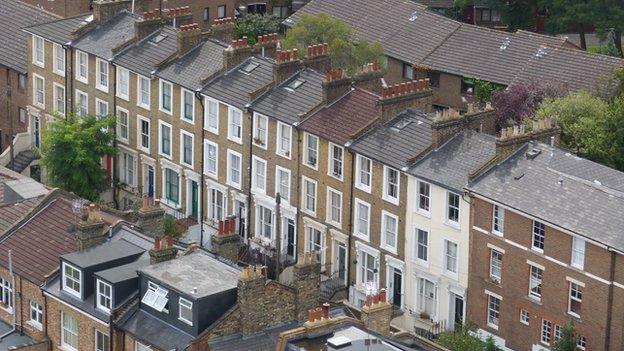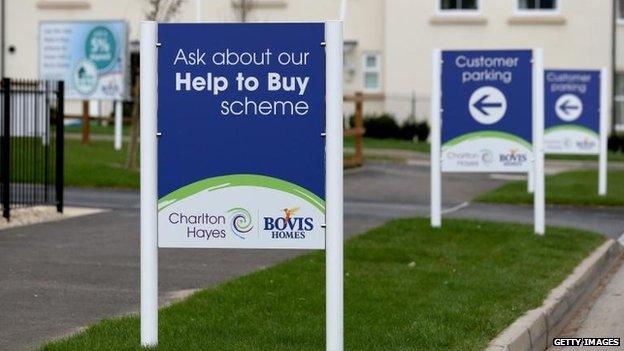Bank of England asks for extra powers over housing market
- Published

The Bank will have stronger powers to prevent a housing bubble
The Bank of England has asked formally for new powers to prevent a housing boom and bust.
Under the powers, the Bank would be able to limit how much people can borrow to buy a home, according to their financial circumstances.
The Bank has also given a clean bill of health to the government's Help to Buy mortgage scheme.
Its Financial Policy Committee (FPC) can already make recommendations about loan amounts.
Earlier this summer the FPC recommended that banks and building societies restrict lending of large loans - by which it meant loans greater than 4.5 times income - to 15% of mortgages.
In June, George Osborne promised that the Bank's powers to "recommend" would be beefed up to powers to "direct", in order to prevent a dangerous bubble developing.
Buy-to-let measures
The FPC also noted that high loan-to-value lending now accounts for just 9% of mortgages - compared to 25% in 2007, during the boom - suggesting that riskier lending has not got out of hand.
But the Bank said it wanted its new powers to cover both residential and buy-to-let mortgages.
On buy-to-let, it wants to make sure that the income that landlords receive is greater than the interest payments on their mortgages.
Placing such controls on professional investors might help cool the housing market, by preventing landlords speculating on hefty rises in house prices.
The stronger powers are expected to be in place before June next year.

The Bank of England says the Help to Buy scheme is not to blame for rising house prices
Help to Buy
Last year, the Bank of England was asked to report back on whether the government's Help to Buy mortgage scheme posed a risk to the economy.
The Bank's governor, Mark Carney, has now written to the chancellor stating: "Under current market conditions, the committee assesses that the scheme does not pose material risks to financial stability."
The Bank also confirmed that Help to Buy was not to blame for rising house prices.
It said both parts of the scheme accounted for only 5% of total mortgages, and they had been most popular in parts of the country where prices had risen least.
"The scheme does not appear to have been a material driver of growth - for example, take-up of the scheme has been weak in London, where house price growth has been strongest," the FPC said.
It also said house prices appeared to be cooling sooner than the FPC had expected when it met in June.
Earlier this week, the Nationwide said annual house price inflation had fallen to 9.4% in September from 11% the month before.
Help to Buy loans are already restricted to 4.5 times a borrower's income.